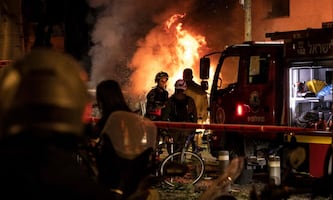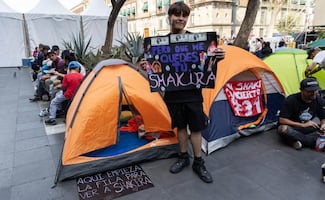Más Información

FGR confirma entrega del cuerpo de "El Mencho", exlíder del CJNG a familiares; se realizaron pruebas genéticas para identificarlo

México ofrece protección consular a connacionales en Medio Oriente; aquí la lista de países que cerraron espacio aéreo

Cae Jorge Yáñez, excontador de Emilio Lozoya en Querétaro; es acusado por defraudación de 28 mdp en el sexenio de Peña Nieto
The magnitude and brutality of the Easter terrorist attacks in Sri Lanka that killed at least 253 people go beyond the capacity of local groups; therefore, it is necessary to study the competing foreign interests in a geopolitical backdrop , in order to understand who benefits from the bombings against Christians last week.
To begin with, the infighting in the Colombo government can give us a clue about the forces competing for hegemony in Sri Lanka and South Asia , as well as an explanation about why intelligence failures and ignored warnings preceded the worst attacks in the region—claimed by the Islamic Stat e ( IS )—since the Bali bombing of 2002 , attributed to Al Qaeda and the Indonesian affiliated group Jemaah Islamiyah .
A serious political crisis erupted in October 2018 , after President Maithripala Sirisena abruptly sacked Prime Minister Ranil Wickremesinghe and replaced him with former rival—and former president— Mahinda Rajapaksa , on the grounds of personal differences that Sirisena considered “irreconcilable.”
However, according to the Indian and Sri Lankan press Sirisena dismissed Wickremesinghe, who allegedly had plotted with New Delhi his assassination, in favor of the pro-China Rajapaksa due to pressure from Beijing . Weeks later, the Supreme Court overruled the president and Wickremesinghe has continued to serve as Prime Minister.
On Monday, while police found 87 bomb detonators at Colombo’s main bus station, Cabinet spokesman and Health Minister Rajitha Senaratne said that information had been available about the attacks as early as April 4 , yet it was not passed on to Wickremesinghe.
The information, remarked police sources, was obtained from the Indian foreign intelligence agency RAW ( Research and Analysis Wing of the Cabinet Secretariat ).
Senaratne added that “this is the only country where, when the prime minister summons the security council , they don’t assemble,” alluding to Sirisena, who also has the portfolio of Defense and heads the National Security Council.
Harin Fernando
, Minister for telecommunications , tweeted that “serious action needs to be taken as to why this warning was ignored,” and Mano Ganeshan , Minister for national integration , said that officers within his dependence had been warned that suicide bombers would target politicians.
Belt and Road Initiative
China
has developed important economic ties with the old Ceylon , which plays a key role in the Belt and Road Initiative .
During the final stages of the 25-year civil war between the Tamil separatists and the majority Buddhists that ended in 2009 leaving 100,000 killed, Beijing provided weapons and defended the Rajapaksa government from censure on war crimes at international human rights forums.
Countering the traditional Indian influence even in the Tamil-dominated northern and eastern areas, China has been a major participant in post-war Sri Lanka’s infrastructure plans .
Among the main projects are the USD $1 billion Hambantota Development Zone , the USD $1.4 billion Colombo Port City project , and the USD $1.35 billion Norochcholai Coal Power Plant project .
Of these, it is the Hambantota project that has garnered the most attention worldwide, albeit for the wrong reasons.
Unable to pay back the loan as the port failed to attract business, Sri Lanka handed over the harbour facility to Beijing in 2017 on a 99-year lease , giving the Chinese navy, despite Colombo’s claims that it will not allow Chinese military activity in Hambantota, a key deep-water port just south of India in the middle of the Indian Ocean basin .
In the game of regional alliances, India initially supported the Liberation Tigers of Tamil Eelam ( LTTE ) just as Pakistan did the same with the Taliban in Afghanistan and Muslim extremists in Kashmir.
After a failed military intervention in 1987-1990 , New Delhi closed ranks with Colombo and as a result, an LTTE suicide bomber murdered Indian Prime Minister Rajiv Gandhi in 1991 .
Indian security sources, however, have speculated at possible involvement by rogue elements within the Pakistani intelligence .
They said some Sri Lankans and Maldivians had trained in Afghanistan along with the Islamic State-Khorasan Province , an ally of IS . Around 35 Sri Lankans are said to have joined IS and fought in Syria.
Authorities in Colombo stressed that the obscure group National Thowheed Jamath ( National Monotheist Organization ) had carried out the attacks, with the help of an “ international network .”
Previously, NTJ , connected to Tamil Nadu Thowheed Jamath , an extremist group based in southern India , was known mainly for vandalizing Buddhist statues and shrines. Its leader , Abdul Razik , was arrested in 2016 on charges of inciting racism .
In 2018 , press reports that revealed social media was used by Sinhala Buddhist groups to target Muslims , which comprise less than 8% of the country’s population, led to communal riots. The situation repeated last year in Kandy district .
Tensions between ethnic Tamils and the Sinhala majority
—nearly 74% of the 22 million population—continue to be fraught, yet Tamil Muslims generally avoided taking sides through the civil war. Christians, for its part, are about 6% of the population.
Presidential elections
are scheduled to take place before December 9, 201 9, followed by Parliamentary elections before December 1, 2020 .
In January , IS claimed responsibility for an attack that killed 20 people at a church in the Philippines .
Last May , the organization also claimed responsibility for carrying out attacks at three churches in Indonesia , killing 12 people, while in 2017, on Palm Sunday , IS bombs killed 49 gathered for Mass at two Coptic churches in Egypt .
Editing by Sofía Danis
More by Gabriel Moyssen
Noticias según tus intereses
[Publicidad]
[Publicidad]












